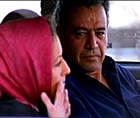
Who Gives Kisses Freely From Her Lips 2009
Distributed by Third World Newsreel, 545 Eighth Avenue, 10th Floor, New York, NY 10018; 212-947-9277
Produced by Simin Farkhondeh
Directed by Simin Farkhondeh
DVD, color, 41 min.
Sr. High - Adult
Gender Studies, Human Rights, Middle Eastern Studies, Religious Studies, Women's Studies
Date Entered: 03/08/2010
Reviewed by Winifred Fordham Metz, University of North Carolina at Chapel HillSimon Farkhondeh combines fact and fiction to interesting effect in her film investigating temporary marriage in contemporary Iran. The audience is introduced to a young filmmaker named Salome (played by actress Goli Samiie) who is returning to Iran after many years living abroad in America. Salome's homecoming centers on her intent to uncover mysteries shrouding the practice of Sigheh, or temporary marriage. In Iran, according to Shia' Islamic custom, a single/divorced/widowed woman or a single/ /divorced/widowed or married man can opt for a trial marriage (ranging in as little time as a few days up to 99 years). This practice is held in disregard by some and applauded by others. Skeptics assert that the custom is used illicitly by ill intentioned men looking for affairs and some liken it to legalized prostitution (quite possibly underscored by the fact that men are allowed multiple simultaneous Sigheh wives - while women are only allowed one Sigheh husband at a time). Proponents offer that it is a reasonable way for couples to confidently test the potential for enduring success of a relationship. Either way, it is a very complex and layered negotiation rich in history and practice.
Farkhondeh's fictional premise paves the way to factual pursuit when Salome asks her father to help find people who have participated in temporary marriages, so that she might interview them for her film. Reluctant at first, her father introduces her to an old friend, Reza. As Salome begins interviewing individuals and couples who have actually participated in Sigheh, she comes to rely on Reza for more introductions and assistance navigating her way around the country. Soon, Salome finds herself embroiled in an unexpected partnership, as she ventures into the most intimate glimpse of Sigheh - her own!
Here, the fictional arc of Reza and Salome's temporary marriage at turns distracts the viewer from a series of compelling interviews (which range from forlornly frank to studied - one man asks that a negative comment be cut from the interview for fear of casting a bad light on the custom) while ultimately underscoring the complexities of such an arrangement. Whether by the use of fictional narrative or the weight of the interviews, the film successfully sheds light on an otherwise taboo topic and offers insight into one aspect of modern love in contemporary Iran.
This film would benefit classes focused on women's studies, marriage and family, gender studies and Middle Eastern studies.